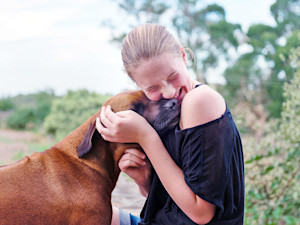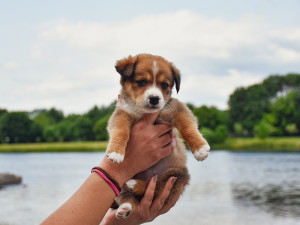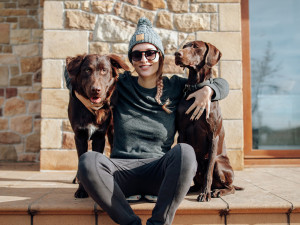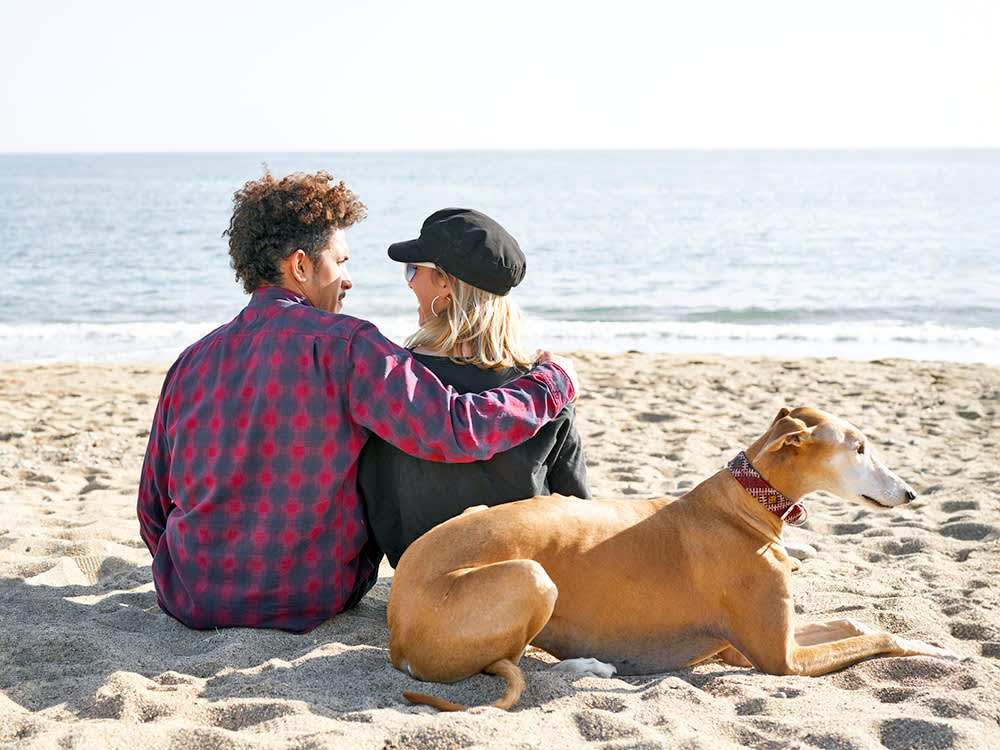
Share Article
Not all dogs are party animals. For example, my human partner is more of a golden retriever-type than my dog. Perhaps you, too, have found that your pet prefers solitude, is indifferent towards other dogs, or seems to understand the phrase “cancelled plans” on an emotional level. Especially when combined, these behaviors may have made you wonder: Is my dog an introvert?
Creatures across the animal kingdom, including chimpanzees and octopiopens in new tab, exhibit qualities of introversion and extraversion. However, these behaviors aren’t necessarily synonymous with human extraversion and introversion, as originally defined by psychologist Carl Jung in the 1920s. Put simply, people can explain their own motivations; pets can’t. While we may be able to distinguish when our reserved behavior is caused by discomfort versus personal preference, pinpointing the cause of a dog’s behavior isn’t always as direct.
“There are many factors that may contribute to a dog’s personality,” says Robert Haussmann, a certified dog trainer, behavior specialist, and cofounder of Dogboy NYCopens in new tab. He notes that “early learning, socialization, and life experiences can all lend themselves to a dog being outgoing or reserved.” This aligns with a recent study on genetics and behavior in dogsopens in new tab, which suggests that breed isn’t necessarily a strong indicator of an individual dog’s sociability.
Every dog is unique. There is no single diagnostic test to determine your pet’s personality type. However, if you’re looking to understand your pup’s behavior a little bit better, here are eight signs that suggest your dog may be more introverted.

They get overwhelmed easily.
“Being introverted shouldn’t be associated with nervousness,” says Haussman, clarifying that nervousness is an indicator of stress or discomfort while introversion is “a normal state of being for many dogs." However, a dog that is more introverted may find social situations overwhelming more quickly. He cautions against repeatedly putting an introverted dog in stressful environments, like passing an uncomfortable pet around at a social gathering because you think they need to “get used to it.” Keep an eye out for signs of overwhelm, like crouched posture, excessive panting, lip licking, and yawning out of context.
They like their alone time.
Like nervousness, shyness may be a sign of stress or a result of a lack of socialization as a puppy. According to Becky Mathia, a CPDT-KA with Wayside Waifs in Kansas Cityopens in new tab, the longer a puppy goes without socialization (e.g., meeting people, meeting dogs, get accustomed to a collar and leash), the more likely that dog is to be shy when it comes to new experiences in their adult life. However, as Mathia notes, a dog who has always preferred to keep to himself may simply prefer solitude and isn’t necessarily cause for concern. Like introverted people, introverted pets may feel most comfortable by themselves rather than in a big group.
They don’t show interest in other dogs.
Does this TikTokopens in new tab of an “introverted” dog meet-up look familiar? Rest assured, your pet isn’t alone in their apparent disinterest in making friends. “Some dogs are just more reserved,” says Haussman. He says this isn’t something pet owners need to be concerned about unless it’s negatively impacting their daily quality of life. If that’s the case — for example, your pet seems to have anxiety anytime they have to leave home — Haussman recommends consulting with a trainer who specializes in behavioral issues.
They get social fatigue quickly.
Personality types aside, dogs often get tired after playing, socializing, even spending a lot of time sniffingopens in new tab. But some dogs hit their social max quicker than others. You know how a busy day of seeing friends can leave you “peopled”-out, needing some alone time to recharge? Your dog may feel the same. If you’re concerned that your introverted dog isn’t getting enough mental stimulation, try introducing different enrichment toysopens in new tab or games to get them engaged.
They freeze when overstimulated.
Though less obvious than flight and fight responses, Mathia says that some dogs respond to stress by freezing or fidgeting. Freezing, in particular, may be difficult to spot, especially if you have a more reserved pet. Take note of behaviors that come up when your dog is in a new or busy social setting. “Once the dog finds out what works for them in making the scary thing go away, they will continue that behavior until the human recognizes and understands that they need our help,” says Mathia. For a dog that’s more introverted, that may be freezing in response to stress.
They’re choosy with human friends.
A friendly dog isn’t necessarily always interested in making friends and meeting new people. If you notice that your dog limits their interaction with new humans, it could be an indicator that they lean introverted. In fact, Mathia says this a sign of your dog knowing and establishing their boundaries in a healthy way. She says a dog that “separates from something that makes them nervous—[going] to a safe space like a crate or room where they know they can decompress—is a good thing.”
They stick to their routines.
One way extraversion shows up in animals is in their willingness to engage with the unfamiliar. A more extroverted dog may be more curious in new environments while an introverted dog may be more comfortable sticking with what’s familiar. If your dog fits into the latter category, preferring what they know verses something new, they may thrive with a more structured schedule. Try establishing a consistent daily routine that balances enrichment and solitude, like taking walks in a quieter area or making sure they have alone time before or after a more social day.
They’re a “velcro dog.”
Velcro dogsopens in new tab share a lot of behaviors with a pet that leans introverted. In particular, they cling to the person or handful of people they feel safest with. Unless this clinginess is accompanied by other signs of discomfort, your pet probably just likes being around you. “Dogs that are introverts are great companions,” says Haussman. Lean into this rather than forcing them to play with other dogs or engage in overwhelming environments. As Haussman adds, introverted dogs are simply happy to hang with their people, make a few dog friends, and sniff around the neighborhood — and they'll live a productive and fulfilling life doing just that.
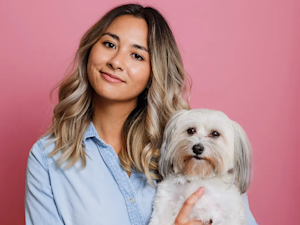
Mia Mercado
Mia Mercado is a writer whose work has appeared in The New Yorker, New York, The New York Times, Cosmopolitan, Bustle, and more. She’s also the author of two essay collections, Weird But Normal (2020) and She’s Nice Though (2022), both published by HarperOne.
Related articles
![nervous person writing next to a cat]()
A New Study Compares Dog and Cat People—One Group Is Clearly More Neurotic
And the other is much more resilient.
![Woman hugging her large brown dog outside.]()
What Is a “Soul Dog?”
And how do you know when you’ve found yours?
![Two hands holding a very young tan and white puppy up in front of a lake landscape]()
How to Socialize a Puppy
Everything you need to know to get your new addition off to a good start.
![Young Woman With Two Brown Dogs.]()
Research Finds Dogs With More Human and Animal Buddies Live Longer
A new study suggests that spending time with your pup isn’t just a way to avoid making plans; it’s great for their health.
![an illustration of people watching tv with their dog]()
Are You Guilty of Using Your Dog as an Excuse to Stay Home?
Your S.O. planned a date night out, but the dog is looking so cuddly on the couch...





